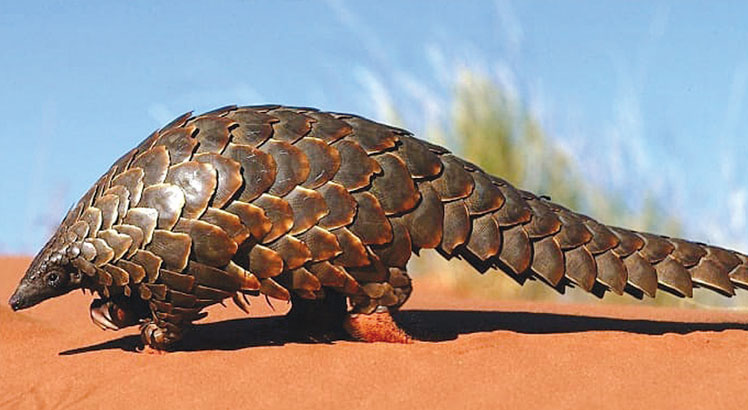Government suspects that some syndicates of foreign nationals from China, Zambia and Mozambique and locals are behind crimes of trafficking pangolins, threatened with extinction in the country.
Director of National Parks and Wildlife Brighton Kumchedwa disclosed to Weekend Nation in an interview this week that between 2021 and 2022, authorities have made 150 arrests and rescued 68 live pangolins estimated at local market value of $1.02 million or K1.04 billion.
According to Kumchedwa, it is speculated that locally a pangolin fetches between five and 10 million kwacha.
Published reports show that pangolins are much sought-after for their scales and meat which can cost more than $3 000 per kg and $300 per kg, respectively, on the black market. A live pangolin fetches up to $15 000 per kg.
Pangolins are an endangered species
This insect-eating mammal is covered in tough and overlapping scales which weigh between 1.6 kg–33 kg. Pangolins start giving birth at two years and mostly produce one offspring.
There are eight species of pangolins in the world and Malawi has a Temminicks ground pangolin specie found in southern African. It can grow to one metre long.
Statistics from Department of National Parks and Wildlife and Lilongwe Wildlife Trust shows that between 2018 and 2020 at least 42 people were jailed over pangolin-related crimes of poaching and trafficking the animal. One person was sentenced in 2018, five in 2019 and 36 in 2020.
The statistics further show over 237 people have been arrested for the past six years: seven in 2017 and then 25 in 2018. In 2020 the number increased to 84 while in 2021 and 2022 some 99 and 22 suspects were nabbed, respectively.
Kumchedwa explained that majority of those arrested are low-income traders who sell the pangolins to middlemen who in turn sell at a higher profit to foreign nationals.
He said: “We have not yet targeted the markets but we know that the syndicate buys direct from the source by recruiting Malawians to look for the pangolin locally as well as beyond the international borders.”
Kumchedwa could not say how many pangolins are in the country or have been trafficked over the years, but information sourced from Lilongwe Wildlife Trust shows that 125 pangolins were rescued in the last six years. Of this number 17 were last year released back into the wild after rehabilitation.
The report also found that traffickers largely operate outside their district of residence, but within the region they live in, and Lilongwe was found to be more fertile as it is already a hub of other illegal activities.
Other districts where traffickers most operate from include Dedza, a border town with Mozambique, Machinga, Chikwawa and Nsanje in that order.
According to a 2021 report on Review of Wildlife Crime Court Cases in Malawi (2017-2020) by the Department of National Parks and Wildlife and Lilongwe
Wildlife Trust, the sharp rise in pangolin-related cases is as a result of increased trafficking activity as well as improved law enforcement.
Reads the report: “In 2020, pangolin cases far exceeded elephant ones (84 individual pangolin cases versus 40 individual elephant cases). The details of the pangolin trade in Malawi require further investigation; to date it appears to be domestic and almost entirely in live animals rather than scales.”
The report also shows that a total of 52 foreign nationals were involved in cases for listed species during the period. Five Chinese and one Zambian were charged with pangolin-related crimes in 2019.
According to Kumchedwa, the war against trafficking endangered species is being won as government is leaving no stone unturned to dismantle the existing syndicates by, among others, holding cross-border meetings with neighboring countries, recruiting additional rangers as well as improving intelligence and information gathering.
According to the revised anti-wildlife-trafficking law in Malawi, perpetrators caught in possession of live pangolins or any of their derivatives face a prison sentence of up to 30 years, with no option for a fine.
In its World Wildlife Crime Report, the United Nations Office on Drugs and Crime indicated that there has been an increase in seizures of pangolin specimens since 2014 and that most pangolin scales are destined for Asian traditional medicine, with the main markets being China and Vietnam.
For example, the report states that in January 2019 alone, 8.3 tons of pangolin scales originating from Nigeria and destined for Vietnam were seized in China. Three months later, another consignment of 12.9 tons of pangolin scales from Nigeria en route to Vietnam was seized in Singapore.
It is estimated that the global population of pangolins have been reduced by 80 percent the last 20 years
n
The post Parks in war against pangolin syndicates appeared first on The Nation Online.
 Moni Malawi
Moni Malawi 

